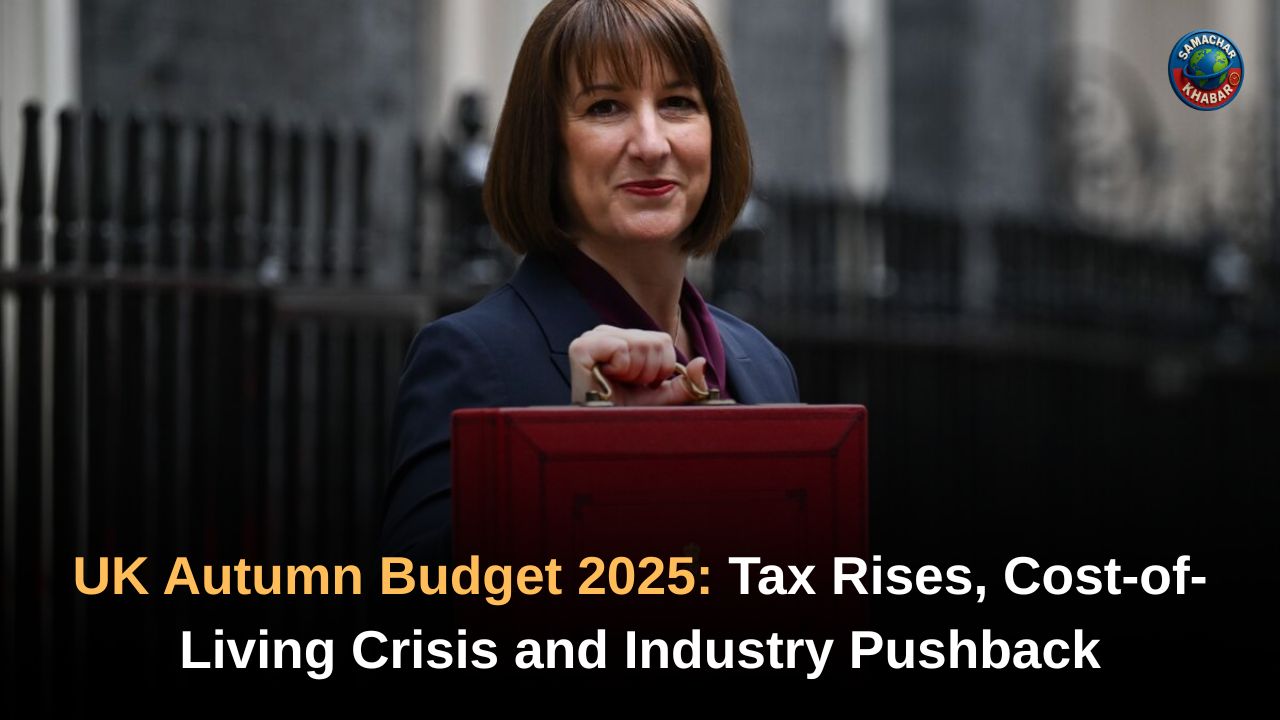UK Autumn Budget 2025: The UK is heading into one of its most consequential Autumn Budgets in years, as Chancellor Rachel Reeves prepares to unveil a sweeping package of tax rises, welfare reversals and fiscal tightening on 26 November. With Britain struggling under stagnant growth, rising living costs and mounting pressure from employers and economists, Reeves faces a political and economic test that may determine the credibility of the Labour government.
This year’s Budget is expected to reshape everything from income thresholds to pension relief, property taxes and business costs — while attempting to restore stability without raising headline tax rates.
Key Takeaways: What the Autumn Budget Means for UK Taxpayers and Businesses
- Major tax rises expected despite Labour’s earlier promises of restraint, driven by a £20bn financial shortfall and downgraded productivity forecasts.
- Extension of income tax and National Insurance threshold freezes to 2030, pulling millions into higher tax bands.
- Salary sacrifice pension benefits likely to be capped at £2,000 annually, subjecting additional contributions to NI.
- High-value homeowners may face new property taxes, including potential mansion tax bands and council tax reforms.
- Landlords could be charged National Insurance for the first time, targeting rental income.
- Industry groups warn of “death by a thousand taxes,” urging Reeves to make broader, strategic decisions instead of piecemeal increases.
- Possible changes to ISA limits, pension tax-free cash, CGT, IHT and even exit taxes remain under review.
- Budget shaped by goals to cut NHS waiting lists, reduce debt and address living costs, without increasing borrowing.
Reeves Faces High-Pressure Budget Amid Economic Stagnation
After just over a year in power, Labour finds itself juggling rising expectations and worsening financial realities. Rachel Reeves’ “iron-clad” fiscal rules originally aimed to inspire investor confidence, but the shrinking buffer has forced the government into another round of urgent tax rises.
The Office for Budget Responsibility’s latest projections — including weaker productivity growth — widened the fiscal gap, leaving Reeves with limited options. With borrowing off the table, the government is preparing to raise more than £30bn in new taxes, following the record £40bn increase last year.
Even Keir Starmer has avoided guaranteeing that future Budgets will be tax-rise-free, hinting at further pressure on the government’s financial plans.
Income Tax Threshold Freezes to Do the Heavy Lifting
While Reeves has ruled out raising the rates of income tax, NI or VAT, she is relying on freezes to thresholds — often labelled “stealth taxes.”
The freeze, now expected to extend to 2030, means more workers will drift into higher tax bands as wages rise. Reeves herself criticised this approach in 2024, saying it “hurts working people,” but the government sees it as unavoidable under the current fiscal climate.
Also Read: Unveiling the UK’s Fiscal Watchdog: What’s the Office for Budget Responsibility and How It Works?
Some in Labour privately feared raising income tax rates would be a political collapse comparable to the 2010 tuition fees debacle — leading the government to abandon the idea despite its clean revenue potential.
Pension Reforms: Salary Sacrifice Under the Scanner
A major revenue raiser could be the government’s plan to cap salary sacrifice pension contributions at £2,000 per year.
Currently unlimited, these arrangements allow employees and employers to avoid NI on contributions. A cap would generate an estimated £2bn annually, largely affecting higher earners.
There is also renewed speculation around the 25% tax-free pension withdrawal, though some reports suggest the Treasury may avoid changes following last year’s spike in panicked withdrawals.
Property Tax Shake-Up: Mansion Tax, Stamp Duty Reform and More
Property taxation is emerging as one of the most contentious parts of the Budget.
Potential changes include:
- New mansion tax bands for high-value homes
- Higher council tax rates for Bands F, G and H
- A single annual property levy replacing stamp duty and council tax
- Stamp duty spread over multiple years
- Possible capital gains tax on high-value primary residences
Reeves is also weighing a surcharge on luxury properties, with around 2.4 million homes in England possibly affected.
Landlords, Investors and Professionals Also Under Pressure
Landlords — previously exempt from NI on rental income — could face new charges of 8% or more. With landlords earning £27bn in 2022–23, NI levies could yield substantial revenue.
Dividend income and capital gains may also be targeted, either through higher rates or reduced allowances.
Rumoured changes to LLP structures could see lawyers, accountants and consultants paying higher taxes, closing gaps in employer NI obligations.
Meanwhile, wealthy individuals leaving the UK may face an exit tax, bringing Britain closer in line with other G7 economies.
Businesses Warn of Rising Costs and “Closed-Door” Policy
Employer groups, especially the Confederation of British Industry, have voiced concerns that Reeves is not engaging enough with them on energy costs and labour reforms.
CBI chief Rain Newton-Smith urged Reeves to avoid “death by a thousand taxes” and instead introduce one or two broad tax measures.
While she welcomed the government’s industrial and trade strategy, Newton-Smith warned that pension changes could make hiring more expensive.
In response, Business Minister Peter Kyle announced consultations on a scheme to cut energy prices by up to 25% for around 7,000 manufacturers from 2027 — an attempt to ease long-standing competitiveness issues.
Where Britain Stands Now: A Defining Moment for the Government
As Labour enters the second year of governance, public confidence is fragile. Cost-of-living pressures remain stubborn, NHS waiting lists exceed 7.4 million, and earlier U-turns on welfare and winter fuel allowances have angered voters. Critics argue the Budget may deepen concerns about broken promises, especially after Labour once insisted tax rises were unnecessary.
The Autumn Budget is not merely a fiscal event — it is a test of the government’s stability, its honesty, and its ability to navigate a country weary of stagnant wages, rising prices and political reversals.
Britain at a Crossroads: What This Budget Truly Represents
As the Chancellor steps up to deliver her second Budget, Britain stands at a crossroads. The government must balance stability with compassion, credibility with ambition, and fiscal discipline with economic stimulus. Reeves is aiming to restore order to the public finances while reassuring families and businesses that better days are possible. Whether the Autumn Budget brings confidence or controversy, it will shape the nation’s economic reality for years to come.
FAQs on UK Autumn Budget 2025
1. What major tax changes are expected in the UK Autumn Budget 2025?
The Budget is expected to include tax threshold freezes, reduced salary-sacrifice benefits, higher property taxes, and potential National Insurance charges on landlords and high-value homeowners.
2. Will income tax rates increase in the 2025 Autumn Budget?
No. The government is not raising income tax rates but will rely on extended threshold freezes, which pull more earners into higher tax bands.
3. How will landlords be affected by the Autumn Budget 2025?
Landlords may pay National Insurance on rental income for the first time, significantly increasing their annual tax burden.
4. Are pension rules expected to change in this Budget?
Yes. A £2,000 annual cap on salary-sacrifice pension contributions is likely, with additional contributions subject to National Insurance.
5. What property tax changes might be introduced?
The government may introduce mansion tax bands, higher council tax on Bands F–H, stamp duty reforms, or even a single annual levy on expensive homes.














